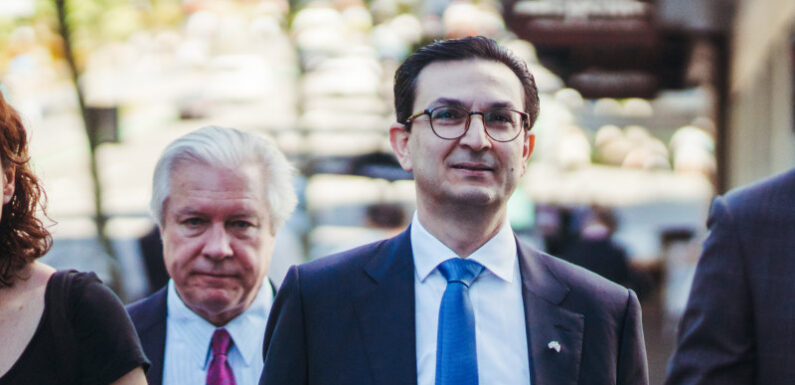
Save articles for later
Add articles to your saved list and come back to them any time.
High-profile orthopaedic surgeon Dr Munjed Al Muderis has been accused of “denying the bleeding obvious” during his defamation trial against The Age, The Sydney Morning Herald and 60 Minutes.
During cross-examination in the Federal Court in Sydney on Tuesday, Dr Matt Collins, KC, barrister for the media outlets, was repeatedly told by Al Muderis that he did not recall specific interactions with patients and disputed the allegation he was inattentive to patients after their surgery.
Surgeon Dr Munjed Al Muderis outside court in Sydney.Credit: Dion Georgopoulos
Al Muderis is suing the newspapers and current affairs program over reports published and aired in September 2022. He alleges the reports convey a range of defamatory meanings, including that he negligently performed osseointegration surgery and provided inadequate aftercare.
In response to a December 2014 letter tendered in court and addressed to former patient Anna Rochford that mentions her consultation request for osseointegration services at his clinic, Al Muderis said he could not have offered the services because he didn’t have the skills or experience.
“I didn’t have the skills, nor the experience at that particular time, nor the technology available to me at that particular time, to perform osseointegration surgery at that level,” he said.
“I developed the skills and I developed these technologies years later.”
Collins said Al Muderis’ denial seemed to defy the nature of the letter that was tendered in court, which specifically mentioned the term ‘osseointegration services’.
“This doctor has, with respect, denied the bleeding obvious in relation to document after document concerning potentially providing [a former patient] with osseointegration services,” Collins told Justice Wendy Abraham.
The procedure, pioneered by Al Muderis, involves inserting titanium pins into the residual bone of an amputee, which allows prosthetic limbs to be connected.
The court heard that Rochford, a cancer survivor, underwent a neurectomy with Al Muderis in December 2014.
Surgeon Dr Munjed Al Muderis in his scrubs.
The then 43-year-old, despite having her right leg amputated, had an active lifestyle, the court heard, engaging in pilates, mountain climbing, scuba diving, skiing and off-road motorbiking before seeking treatment from Al Muderis to reduce neurological and phantom pain.
After Al Muderis performed the neurectomy, a procedure which removes all, or part, of a nerve, Rochford was moved to the intensive care unit after waking from the surgery and experiencing pain “unlike she had ever experienced,” Collins said.
Rochford was experiencing such intense pain that she was prescribed morphine, valium and given an epidural.
Collins put to Al Muderis that after she went to the ICU he did not visit her in hospital and only spoke to her on the phone – allegations Al Muderis denied.
The court heard Rochford was left with post-traumatic stress disorder over the incident.
Collins told the court another patient, Habibul Rahiman, complained to Al Muderis after surgery that: “I cannot move, I cannot touch my leg, it’s so painful, even though I’m on two types of painkillers. Why is this happening?”
Al Muderis said he could not recall this interaction.
Collins also told the court another patient, Tony Malborough, told Al Muderis that “I don’t want you to bloody touch me, I’m not coming backwards and forwards like a yo-yo”.
Dr Munjed Al Muderis during his interivew on 60 Minutes.Credit: 60 Minutes
Al Muderis said he was unable to recall this interaction either.
Collins also accused Al Muderis of being more attentive to patients in the early days of his osseointegration practice, in 2014, which the surgeon denied.
The court also heard Al Muderis believes osseointegration surgery is so new and unique that it can lead general practitioners and other medical professionals not acquainted with the procedure to misdiagnose infection at the site of the prosthetic limb.
“It’s a technology in its infancy,” Al Muderis told the court. “It will take decades to educate the population of clinicians about what is infected, what’s not infected.”
Nine Entertainment Co, owner of the media outlets being sued, is seeking to rely on a range of defences including a new public interest defence, truth and honest opinion.
The trial continues.
Get the day’s breaking news, entertainment ideas and a long read to enjoy. Sign up to receive our Evening Edition newsletter.
Most Viewed in National
From our partners
Source: Read Full Article


